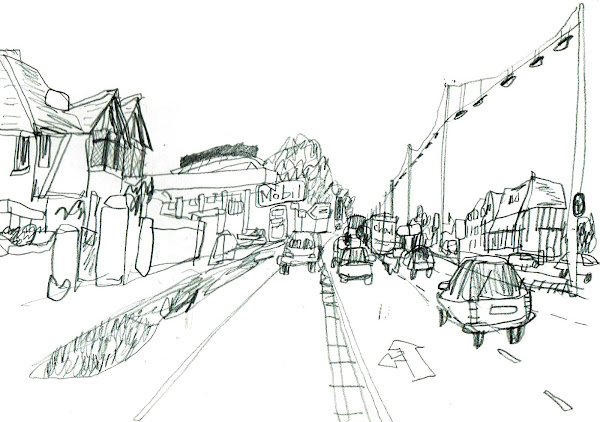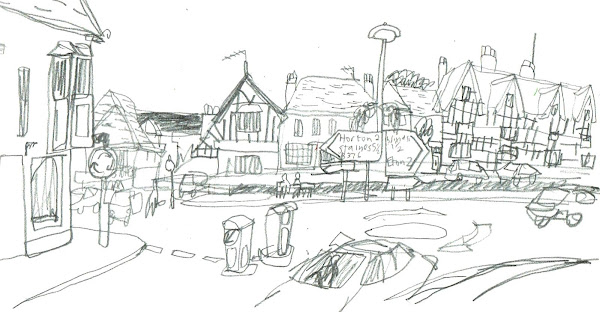 |
| James Hobbs, Bucklebury, Berkshire, 1990 |
Read an introduction to my drawing journey around England, which started 30 years ago.
[Bracketed sections like this have been added in 2020.]
The first night out. I have ducked off the A4 down a narrow road that, by the speed they are going, is well known by the commuters rushing home. I get the idea that the van and I are a rude intrusion into their well-ordered lives, getting under their feet. I dawdle along in the same direction, trying to find the village of Bucklebury: it is spread thinly through the lanes, and I never know quite if or when I have found it.
In looking for places to camp each night I am going to avoid the camp sites whenever I can and knock on peoples' doors to see if they can direct me to some quiet corner, and at least give England's reticent population the chance to say something to me and save money into the bargain. I have driven miles searching for the right sort of place when I come across a large white house at the end of an intimidating gravel drive that I select as my first target for somewhere to stay.
The door flies open to reveal a man in plus-fours and a mobile phone hanging from a belt like a revolver. A lean, elderly, military looking man, barks over to me, "What can I do for you m'boy?" in a colonial sort of way. I tell him what I'm doing and how I am looking for somewhere I can pull in for the night, words I was to repeat hundreds of times over the months.
"Morton! Aha, of course! My father had a bookshelf full! Never did get around to reading any myself."
But he leads me to a small gate down one side of the garden, which goes into a narrow field where I can stop for the night. He leads me past firewood stacked against a hedge to show me where I can park. The pile, he says, has not gone down over the past mild winter - "but it's a dreadful frost valley down here. Down to minus ten last week."
Expressing surprise here was a mistake on my part, and he jumped as if he'd caught me out.
"Towny! You're a towny! Only a towny wouldn't know it's been so bad!"
The sky is ominously clear, and I feel I am about to find it out tonight.
I heat a tin of soup and then follow the footpath that leads through the field to a horse-smelling criss-cross of tracks behind the hedges. There is a leafy wood that muffles the footsteps and every other sound, the acoustics of the English jungle.
But it isn't as silent as it seems. Over the birdsong is the white noise of the M4 and a ceaseless rumble of Heathrow traffic, two inescapable links with another pace of life. Coming back out of the fields as darkness falls I pass a line of bungalows that look over to the woods and click, click, click, their security lights come on one by one.
 |
| James Hobbs, Bucklebury Church, 1990 |
In the morning, my host is up in time to chat with me while the toast burns, painting a vivid picture of the whole of the south of England being overrun with deer, stripping trees of their bark as they go. He's really got it in for me now.
"If you'd been up at a decent time this morning, your..." he points at the van, struggling for the right word, "thing would have been surrounded by them. No education!" he concludes.
I offer him a cup of tea, but he has, after all, not yet concluded, and turned instead to his views on letting the starving of the third world die out naturally rather than being "mollycoddled" by the likes of "us". "Thinning out" he called it.
He waves me off, and I think he will miss me being around to shout at. I stop to draw in a gateway on the way to Bucklebury Church, listening to a cuckoo somewhere across the valley while a stack of pornographic magazines blow around the road. The church is hemmed in between the rectory and post office, now The Old Rectory and The Old Post Office. This is ideal commuting country, encouraged by all those country living articles in the colour supplements. The migration of rich and poor between city and country continues. It seems quite possible though that one day there will be no such thing as a "local".
*****
Even if you are driving around the lanes of Berkshire looking for a gibbet on a hill, it still comes as something of a surprise when you finally come across it. And today probably more so, as, chugging up the hill towards Combe Gibbet, I can make out the unmistakable form of a figure hanging from it.
 |
| James Hobbs, Combe Gibbet, Berkshire, 1990 |
From the twinkling lights reflected from car windows parked on the hill on this hazy warming morning, there is evidently a crowd out to see it. I have never considered myself an ambulance chaser but there is an allure to this macabre sight, and one I can't resist.
Getting closer, leaving the car park and its drowsy occupants with their BBC Radio 3 and vacuum flasks, I can see they are not concerned with the gibbet at all but giving their attention to group of grounded hang-gliders in the next field.
"'Not enough wind, just not enough,"' a helmeted man is saying. He turns to the little group and just for a moment I get the idea he's going to ask us all to blow.
The limp legs hanging from the huge T-shaped gibbet are way out of reach, but a soft stuffing is still visible oozing from one of the trouser-legs. The jacket is packed so tight that the few buttons that are left are popping off. The head is of stuffed sacking. It droops weightily, the noose giving it that same jerked angle you see in old black and white photographs from the hanging heydays.
On the opposite arm of the T, a sign has been hooked, awkwardly written, weathered and calling for good neck muscles and eyesight.
I am a farm worker who earns £120 a week. My rent is £30 a week, food for my wife and I is £60 a week. This leaves me £30 a week for clothes, transport, furniture and all the other things in life. I cannot afford a holiday. How can I afford £4 a week for our poll tax. This is the only way out. Please help to change this unfair system.[The poll tax or, as the then prime minister Margaret Thatcher insisted on calling it, community charge, was a flat-rate tax that fell disproportionately on the poor. Her insistence on its implementation helped bring her down later in 1990. I came across a few other poll tax demonstrations on the tour.]
As a site for such a protest, you had to hand it to him. How can you resist such an apparition visible across half of Berkshire? The gallow's uses are now certainly few, but the farm nearby is obliged to maintain it in the condition it was in when it was erected to hang two child murderers in the 17th century, the only time it was used. There are signs of recent repair, new wood and metal plates to show it is still observed, and a steady supply of walkers over the hills to stand and watch.
| James Hobbs, From Inkpen Beacon, 1990 |
The air moves a little, enough to set a body rocking on a gibbet, but still not enough for the hang-gliders.
*****
The second night out, and I'm feeling pretty good having parked up a long, disused lane, waking to silence from the fields around, silence even from the skies, but then too silence from the engine, which splutters but does not start. And so my second morning out brings my first appeal to the RAC. With the help of a farm labourer who was happened to be spraying a field nearby we pushed the van to within sight of the road and I set out to look for a phone. [Mobiles were a rarity in 1990.]
There are few more uplifting sights than an RAC roadside recovery van coming around the corner and one I was to find did not diminish with frequency. A man jumps out with a precise moustache slicked into place. He is the nearest thing to Salvador Dalí I have seen. He fiddles with the spark plugs, and I have to turn the engine over from time to time as they are tested.
"And again." It is like a doctor asking me to say "aaah".
"The compressor," he announces. I am still dreading that this may mean the whole journey is over before it has hardly started, when he asks for £1.50 for a replacement. A rummage through my pockets only brings to light £1.24 in assorted change, which he accepts.
As I'm pulling away, he calls to me, words I cannot quite make out. They may well have been: "See you again!"
James Hobbs, 1990
Next: Winchester. Read about it here.
[See more of my drawings on Instagram.]







